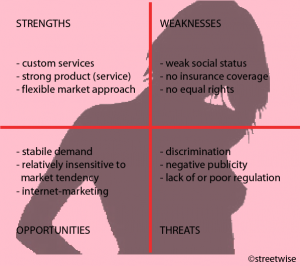Sex work is work
 A paydate is like a time machine. Or better yet, a zone constructed to escape a definition of time and place.
A paydate is like a time machine. Or better yet, a zone constructed to escape a definition of time and place.
Quantum prostitution
Our policy makers have been attaching irrelevant data to the sex work industry for a while already. To create a continuum in which all complicating assets are eliminated in order for theories to be launched without any resistance. Why then, should we not apply the relativity theory to prostitution, granting full access to free interpretation. Let’s start by extending a parallel and define the basic principle of the theory as seen from quantum prostitution:
‘The laws are the same to all, regardless of the speed or relative motion of an observer compared to other observers.’.
Reputation damage based on lies
Now back to reality. The sensation of being in a world of its own, which comes into existance during a date – in which only you and your client matter – is what we always try to create. After all, you want to deliver a memorable time for your client. In marketing terminology we could state that we are proudly selling an ‘experience’.
When external influences are impeding our creativity, succesfully creating a sensual scene become a challenge. Influences that result from carefully constructed fear of the industry. Fear of condemnation when buying sexual services which have been made morally condemnable.
The psychology of this tactical move is comparable to marketing techniques used in tv commercials. Only now, in reverse. Instead of triggering a ‘want’, a ‘fear’ is being programmed aimed to deny the ‘need’ or to seek alternative methods of satisfaction. Naming and shaming, no matter how controversial, is a tool used to apply pressure. What comes into my mind are words like ‘intimidation’, ‘slander’ and ‘reputation damage’.
“Tell Me Lies, Tell Me Sweet Little Lies”
Anti sex work policy has started to increasingly effect my work during the past two years. A regular escort date starts off with a social chat and a drink to initiate an informal atmosphere. With new clients it is also an introduction to add a more personal touch to the encounter. Being in the business for more than a decade, I was not used to clients hesitantly asking questions like: “can you confirm that you are not forced to do this?” At that instant I do feel forced to confirm my independence and freedom. Another neuro-psychologically induced question that has come my way is: “Am I required to ask you for your ID?” With a (hopefully) silent sigh, I make it clear to my client that requesting my ID is an absolute no-go. Out of the question. It certainly does not add to the sensation of an erotic date. One might as well ask if I have filed my IRS papers.
Marketing – Strength/Weakness/Opportunity/Threat
Where is this headed? Is it a matter of time before all of us carry tattoos stating that we are certified by the government? Maybe on our forehead, next to the other stigma. Or in our necks, on the legs or other compulsory spots to get a marking. A simple SWOT-analysis (see figure) shows that the industry has a good product and stable market demand. The Weakness/Threats quadrants is fully dominated by failing government policy.
Below the belt
Decriminalizing is a word used to accomodate and soothe the industry’s voices for equal rights. And to create an image where the government is not opposing but supporting. An image which enables the destruction of any sound of discrepancy. Simultaneously, it is a word which attract the attention of politicians. Almost like a freshly painted door or fence with a sign that says “Don’t touch! Wet paint!” Everybody seems to have the urge to touch it until it is completely ruined. Only to conclude that the paint job was useless. And… if criminalizing is no longer an option, then the back-up plan of moralizing comes into effect.
Up to now, I seem to fail trying to link government interference to the safety of sex workers, although that is usually mentioned as being the underlying goal. In reality I feel my safety and my privacy are increasingly being compromised. And we have not even started to talk about loss of income. Let us stay on the marketing point-of-view in this blogpost.
I reside in a relatively scarce populated part of the Netherlands, in the southern coastal province of Zeeland. A region where the desire for discretion is stronger in all market segments compared to the big cities. One of the reasons may be that social or neighbourhood watch in periferic regions is more alive. The government is now lined up to take the side road, or the previously mentioned back-up plan. It is betting heavily on destroying discretion. Since discretion, in my humble opinion, is one of the pillars of our core-business, being the services of sex workers, it feels like being hit by friendly fire.



Leave A Comment